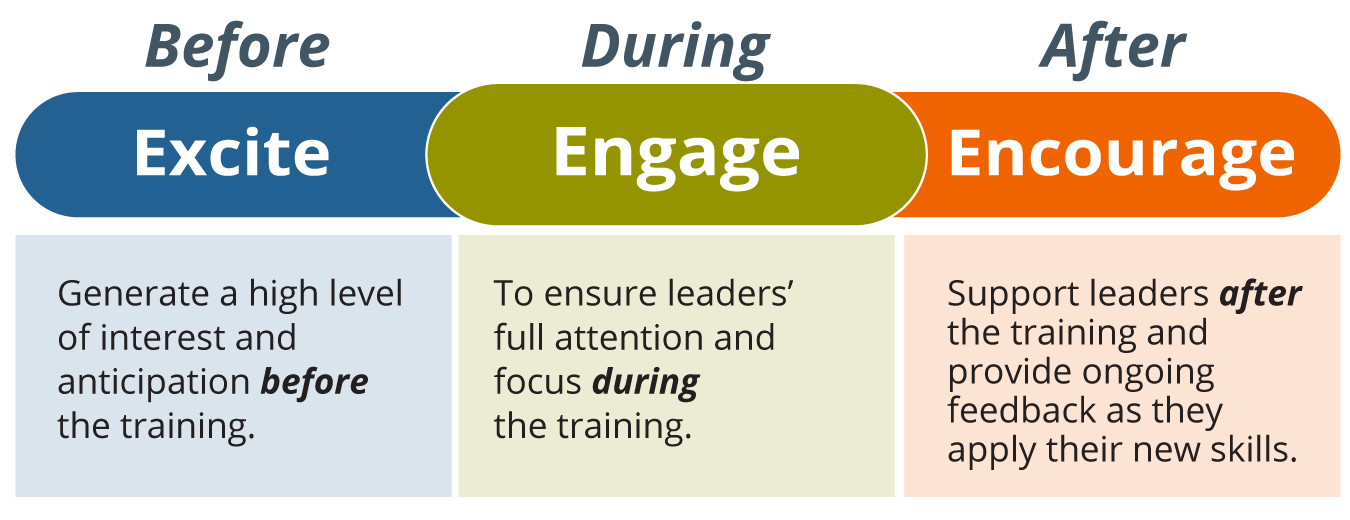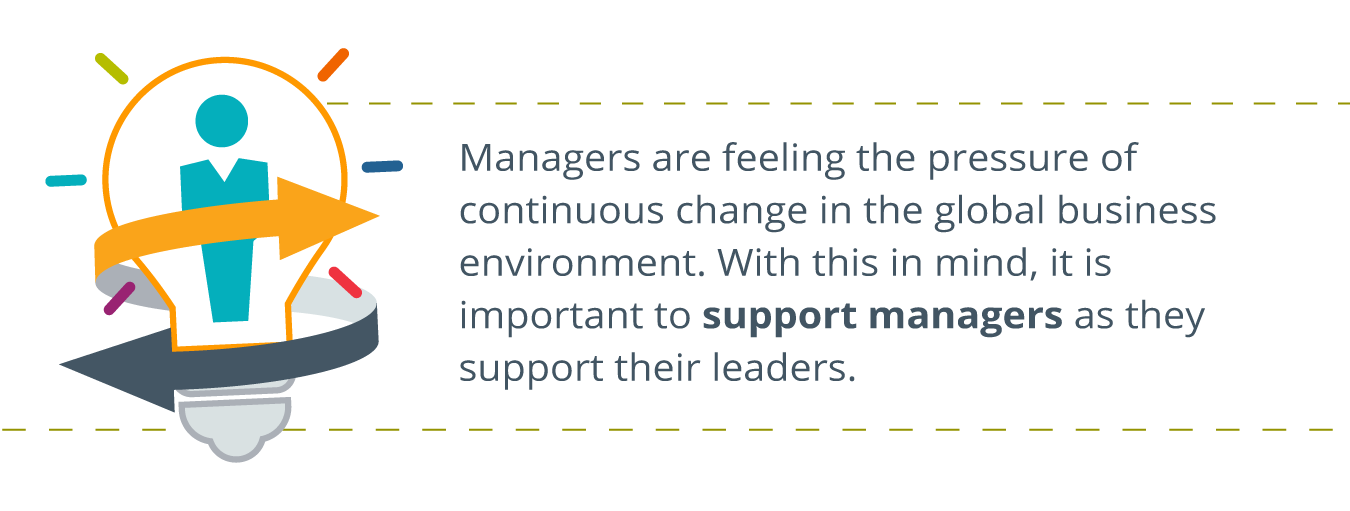“Is My Boss Going Through This Program Too?”
According to our research, one in four leaders say their manager isn’t effective at coaching them to develop into a better leader. It’s clear that many leaders lack manager support in their development experiences. But why is manager support so important?
While many factors contribute to the success of your leadership program, our research shows that involving managers to support and reinforce application of new skills is the biggest lever you can pull to increase program success.
Many organizations struggle to get manager support because they assume managers already have what it takes to be a good role model. But that’s not always the case. In fact, many higher level leaders still haven’t mastered key leadership skills, despite their higher-level role.
The good news is that there are simple, actionable steps every manager can take to support leadership development. And let’s not forget that managers are leaders too—and they need just as much support as leaders actively training in your development program.

What Are the Barriers to Manager Support?
Are your managers the biggest champions of leadership development? Or is development one more thing on their never-ending to-do list? If they are only lukewarm, it may be because of some common challenges:
- Managers feel resistant or hesitant because they don’t think direct reports need development.
- Managers think the leadership program is nice to have, but not critical for improvement.
- Managers think the program isn’t related to business needs and objectives.
- Managers think that leadership development is HR’s responsibility and has nothing to do with them.
- Managers believe that training doesn’t fit with their organization’s culture.
- Senior leaders expect leaders to use their new skills yet fail to model the skills themselves.
- Conflicting priorities keep leaders from participating in manager overview or prep sessions.
How Can Managers Support Development?
A manager’s role in reinforcing and supporting leadership development is invaluable. Their actions, not just their words, can significantly impact how successfully and consistently leaders transfer their newly learned skills to the workplace. Managers can help your organization see a return on investment in training when they excite, engage, and encourage leaders about growth.
The following model illustrates three actions a manager can take to reinforce and support leaders before, during, and after their leadership training.

These three actions reinforce that leadership development is not a single event but rather a journey towards transformation and growth.
What Type of Manager Support Is Needed?
Here are some action steps and practical tips for managers to support the leaders on their teams:
Model Commitment
Managers should connect with leaders as early as possible to demonstrate their commitment and support. They can champion the value of leadership development by sharing personal examples of how they benefited from similar learning and growth opportunities in their careers.
Give the Gift of Space and Time
Managers should require—not just encourage—leaders to disconnect from day-to-day work when they are engaging in any type of leadership development, including digital and self-directed learning. That also means managers should avoid sending non-urgent messages or work requests that can distract or disrupt. With manager support, leaders can embrace development as a way of work and a priority during normal work hours.
Personalize a Focused Development Plan
Managers can make learning more relevant by linking the leadership program to specific problems that leaders need to solve. Leaders may feel overwhelmed with too many needs to address and not knowing where to start. Managers can help them determine what to tackle first.
Managers can also help leaders understand what can be tackled simultaneously and what development gaps aren’t worth worrying about. In other words, managers can help shape a focused development plan that addresses the leadership skills needed to be successful. Unfortunately, research shows that 40% of leaders don’t have a written, up-to-date development plan.
Build Accountability to Apply Skills
Without accountability to apply lessons, learning experiences may go to waste. No one is better positioned to hold learners accountable than their direct managers. Managers can emphasize the importance of practicing new leadership skills right away and making them part of daily work life. They can also provide opportunities such as new job responsibilities, in-role developmental assignments, and cross-functional projects.
Celebrate Small (and Big) Wins
Verbal or virtual “high fives” can go a long way. Managers can recognize and reward trying out new skills or adjusting behaviors for improved results. It’s a way to encourage continuous learning and development among leaders.
Check In Frequently
Too often feedback from managers is infrequent, inconsistent, and inadequate. Regular check-ins with timely feedback and focused coaching can provide support and reinforcement. Managers can initiate a healthy dialog, especially when they spot gaps and opportunities for improvement. There are simple questions that managers can ask to increase the likelihood that leaders will apply their learning in the workplace:
- What have you learned?
- How will you apply it?
- How can I support you?
What Support Do Managers Need?
As leaders themselves, managers are feeling the pressure of continuous change in the global business environment With this in mind, it is important to support managers as they support their leaders. While some managers may have natural capabilities supporting and reinforcing development, others may need a little help. Here are a few ways you can provide the support managers need.

Motivation and Clear Expectations
Too often managers don’t realize the critical role they play, so you need to educate and motivate them. Share data like this to heighten their awareness: Leaders confirmed that the three factors that drive application of new skills are job relevance, personal motivation, and manager support.
Motivation should come from the top. Your Executive Sponsor can explain leadership development expectations for the managers of the learners. Executive Sponsors can also work with HR or L&D to identify metrics to make sure it’s happening. You can choose to include this in the program kickoff or host an additional session just for managers.
The Right Skills and Tools
Most managers don’t have time to take the same leadership program as their direct reports just to gain an understanding of what leaders are learning. At DDI, we do this by providing some simple resources, such as a Manager’s Guide with an overview of learning objectives, core concepts, and key learning tools. But that’s not enough.
A short, synchronous session that presents research about the importance of the manager’s role can build managers’ confidence and capabilities. Armed with insights and information, managers are better equipped to support their employees. They’ll also be in a better position to hold their employees accountable for applying what they’ve learned.
Managers Make a Big Difference
It’s important that managers remain patient and encourage patience, particularly if leaders fall back into old habits after making initial progress.
Often, changing behavior can take longer than anticipated. But with patience and perseverance, the support managers provide can truly make a difference.
